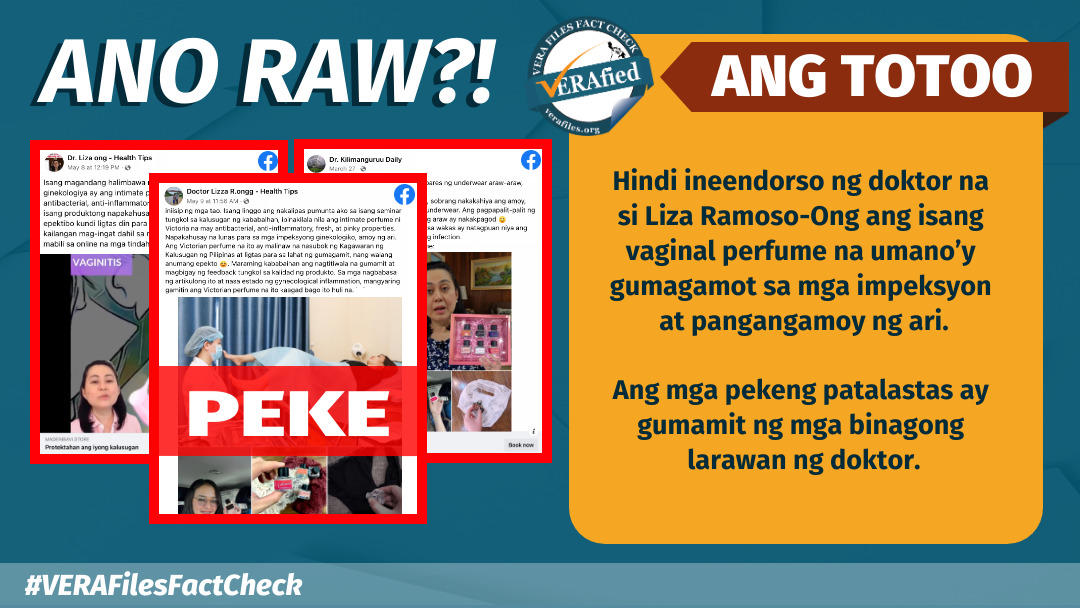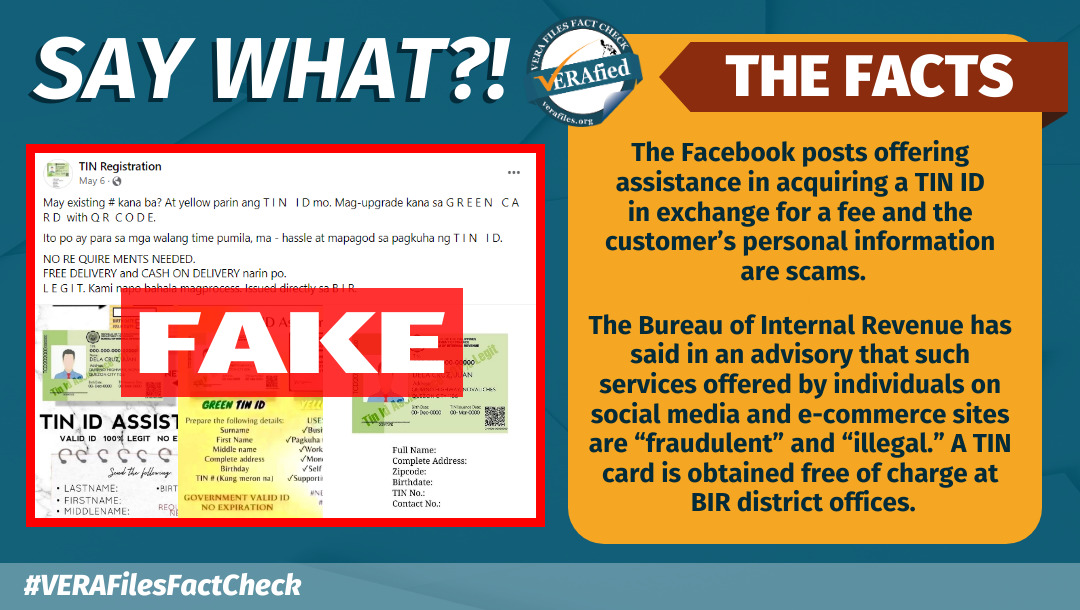A fake government office called “Philippine International Development Agency (PIDA)” is pretending to be a procurement body under the National Economic and Development Authority (NEDA). A reader asked VERA Files to fact check the agency’s legitimacy after a post about it made the rounds on social media.
STATEMENT
In its seven-month-old website pida-ph.org, the sham agency claims to be “affliated (sic) with the Philippines Government for the purpose of handling all Tenders/Projects” and is tasked by the president of the country “to meet the NEDA program.”
Also in its homepage is a declaration of its supposed public procurement mandate:
“We have the sole mandate for the purpose of handling all public procurements in Philippines.”
Source: Philippines International Development Agency, Homepage, accessed Oct. 22, 2019
Despite this being its “sole mandate,” PIDA stated another mandate of its office on its homepage, which is “to increase the quality of lives of Philippinesians (sic) through quality projects.”
It lures local and foreign companies into paying a registration fee of $3,350, or over P171,000, for them to be able to participate in the bidding of contracts for government projects. The agency has a mailing address and an email address declared on their website, as well as a separate tab where companies could “check” the status of their bids.
The agency also named various current and former high-ranking public officials as members of its board, and as its “accredited agents.”
FACT
The agency is bogus.
There is no PIDA in the directory of departments and agencies of the Philippine government. It is also not among the seven attached agencies of NEDA listed on its official website.
Moreover, the national planning agency’s website has its own section on Procurement. It contains details on bid announcements, notices of awards of contracts, and contracts agreements of the agency. NEDA makes no mention of a required registration fee of $3,350 for bidders in its website.
The Philippine Government Electronic Procurement System (PhilGEPS), not PIDA, is the “single, centralized electronic portal that serves as the primary and definitive source of information on government procurement” in the Philippines. PhilGEPS requires a company to pay a registration fee of P5,000 only if they wish to upgrade their status from Red, the default membership type, to Platinum.
The National Intelligence Coordinating Agency (NICA), the office in charge of intelligence collection for the government, has already released a public advisory on Oct. 14 declaring PIDA as “a bogus agency engaged in fraudulent activities.” This was shared by a number of government agencies, including NEDA, the Public-Private Partnership Center (PPPC), and the Commission on Population and Development. The Philippine Embassies in Qatar and Greece, as well as the Philippine Consulates General in New York and Frankfurt, have also posted similar advisories on the matter.
The Department of Trade and Industry also released on Oct. 9 a statement denying Sec. Ramon Lopez’s affiliation with the bogus agency. Former Presidential Spokesperson Harry Roque, who was also named in the website as one of PIDA’s “accredited agents” like Lopez, posted on Oct. 22 an advisory on Facebook: “I do not know this entity nor have I given my consent to be their agent.”
In a separate message to VERA Files, former Department of Social Welfare and Development Secretary Judy Taguiwalo, who was named by PIDA as its “Head of Projects and Evaluation,” refuted the agency’s claim, saying she doesn’t know the office.
Swindling, or obtaining money by committing fraud, is punishable by law under Article 315 of the Revised Penal Code (RPC), with a penalty of imprisonment for a minimum of two months and a day, to a maximum of eight years depending on the amount of money swindled.
Additionally, any person who “shall knowingly and falsely represent himself to be an officer, agent, or representative of any department or agency of the Philippine Government,” could face imprisonment of six months and a day at minimum, to four years and two months at maximum under Article 177 of the RPC.
The two RPC provisions are reflected in Section 6 of Republic Act No. 10175, or the Cybercrime Prevention Act of 2012.
Several features of pida-ph.org, which still remains live, further give away the agency’s fakery.
Incorrect domain name for a government website
While it claims to be an official page of a government agency, its domain name extension is “.org.” Official websites of government offices in the country carry the extension “.gov.ph.” These domains can be administered only by the Department of Information and Communications Technology (DICT). The DICT is also the office in charge of processing applications for acquiring the domain extension.
On the other hand, the “.org” domain, officially handled by the Public Interest Registry (PIR), is “open and unrestricted.” It is declared in PIR’s website that “anyone is allowed to register and use .org domain names.” It is commonly used by nonprofit organizations globally.
Manipulated photos
PIDA’s homepage displayed three banner photos which it claimed to be from the “Ceremonial Signing of the Grant and Launch of the Development of Foreign Investment Framework Project.” These photos were taken during different events and were lifted from other websites.
One is a screenshot of a banner photo from an Oct. 24, 2016 press release on the PPPC website, about a contract signing between the British government and the agency for the development of the Foreign Investment Framework Project. The version displayed in PIDA’s website omitted the last digit of the year 2016.
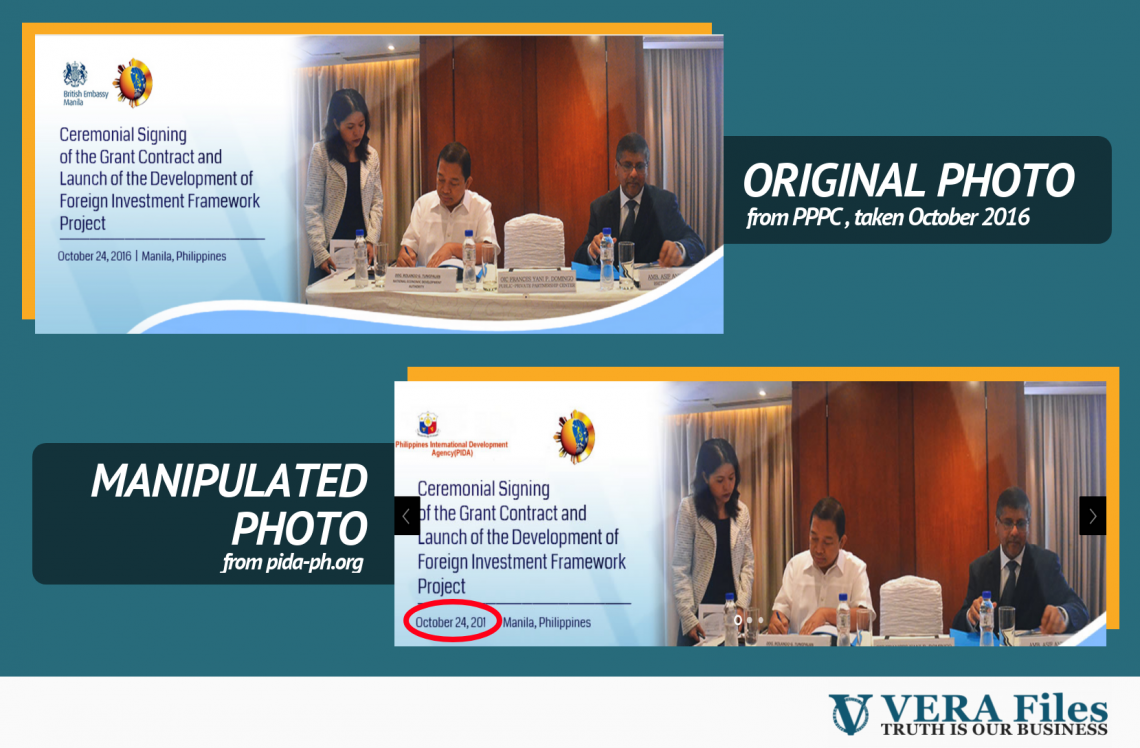 Another photo is a photoshopped image of a contract signing between Chinese engineering firm China CAMC Engineering Co., Ltd. and the National Irrigation Administration in March 2018. The text “Chico River Pump Irrigation Project” was edited to read “PIDA Philippines International Development Agency.” The year 2016 was changed to 2018.
Another photo is a photoshopped image of a contract signing between Chinese engineering firm China CAMC Engineering Co., Ltd. and the National Irrigation Administration in March 2018. The text “Chico River Pump Irrigation Project” was edited to read “PIDA Philippines International Development Agency.” The year 2016 was changed to 2018.
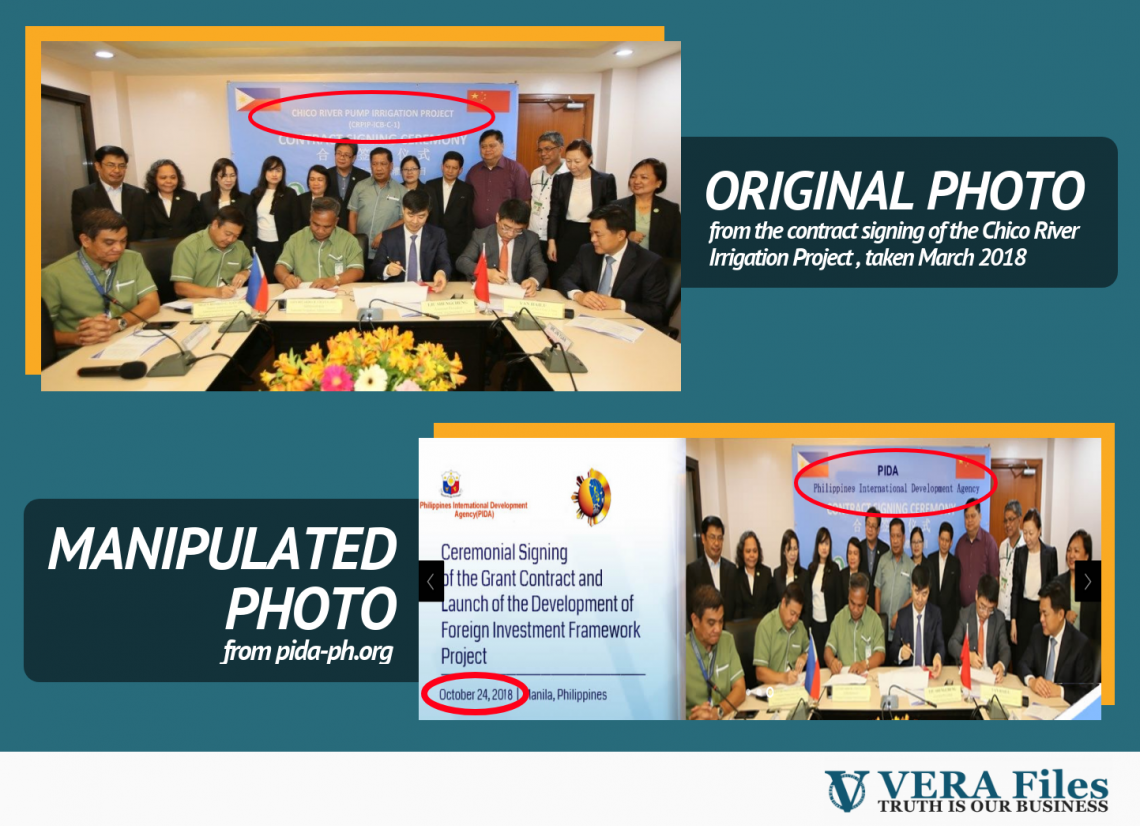
The last photo is lifted from the Commission on Higher Education (CHED) website. It is a June 2017 photo of another contract signing, this time between CHED and the Canadian Bureau of International Education. Like the photoshopped PPPC photo, PIDA’s version of this image omitted the number 6 in year 2016.
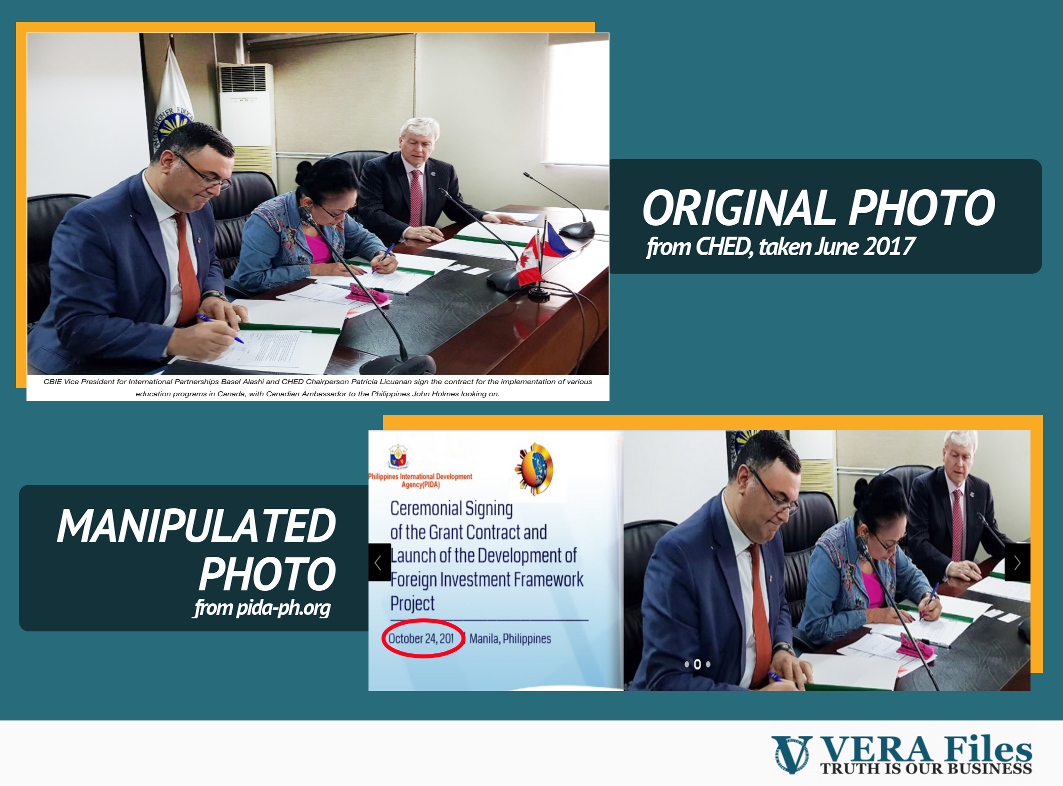
The last two photos were superimposed in the same PPPC screenshot.
Factual inaccuracies
The text on the website’s homepage also claimed NEDA was created out of a proposal “made during the 23rd NEDA meeting in Manila, in July 2010.” This is false. NEDA was established in 1972 through Presidential Decree No. 1-A, as the National Economic Development Authority and was renamed the next year as the National Economic and Development Authority through Presidential Decree No. 107.
There are also names of agencies and organizations included in the text posted on the bogus website which appear to be non-existent, named inaccurately, or without any connection to the Philippines:
- Programme for Infrastructure Development in Philippines – non-existent
- NEPAD Planning and Coordinating Agency – based in the African continent
- Philippines Development Bank – should be Development Bank of the Philippines
- United Nations Economic Commission for Asia – should be United Nations Economic and Social Commission for Asia and the Pacific
The address declared in the website directs to a certain “474 Barangay Hall (Manila)” when searched on Google Maps. The application’s street view, however, show neither a barangay hall nor a government agency office.
VERA FILES FACT CHECK: The ‘Philippine International Development Agency’ is a scam from VERA Files on Vimeo.
Textual errors
Several typographical, grammatical, and style errors can also be found published on the site.
The Confirmation tab is identified as “Comfirmation.” It spelled “community” as “coummunity.” A portion of the text on its homepage spelled “Philippines” as “Philippinest.”
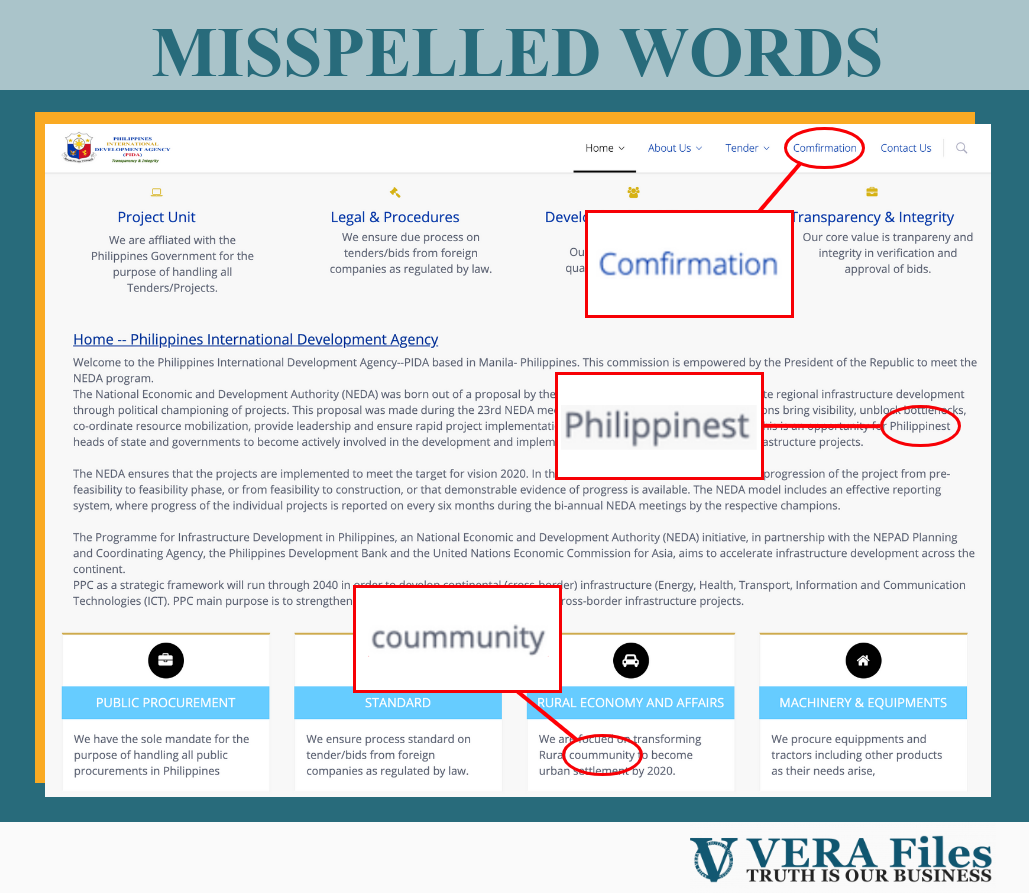
BACKSTORY
A simple Google search revealed that pida-ph.org is a tweaked version of nidagh-gov.org, another dubious website also claiming to be a procurement agency in the country of Ghana in West Africa.

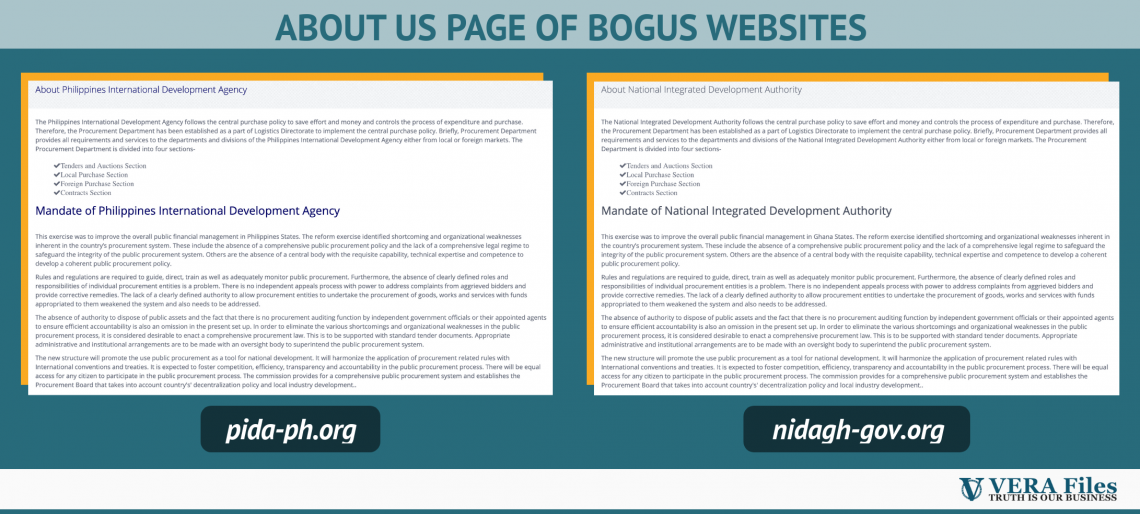
A comparison of the two web pages’ layout shows its similarities.
The text on pida-ph.org’s homepage, however, is from ppc-gov.org, another fake agency also pretending to be a Ghana-based procurement body.
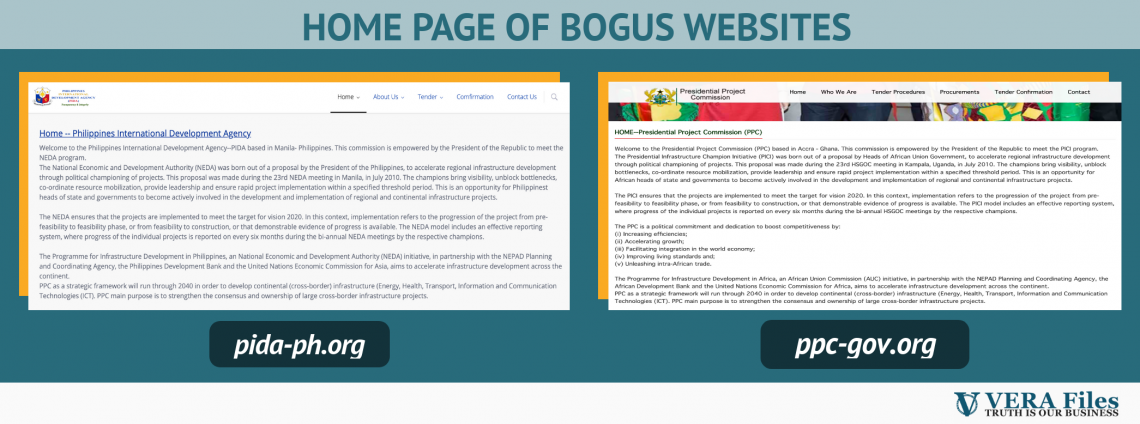
VERA Files Fact Check found four more websites posing as procurement offices comparable to pida-ph.org, nidagh-gov.org, and ppc-gov.org. One of which is another PIDA website created just 52 days ago.
- ncdb-gov.org (supposedly located in Accra,Ghana)
- peaqa.org (supposedly located in Doha,Qatar)
- mned-gov.org (supposedly located in Pasig City, Philippines)
- pidaph.org (also supposedly located in Manila, Philippines)
All of these were created this year. The mned-gov.org, like PIDA, is also a website of a fake “ministry” claiming to be a procurement body in the Philippines. Nidagh-gov.org, on the other hand, is eight months old and appears to be the first one to be created among the seven websites.
A view of the page source of the mentioned websites shows that all except ppc-gov.org are mirrored sites of a now defunct page. Information on the origin of the websites, however, were hidden upon the request of the registrants.
Sources
Gov.ph, Directory of Departments and Agencies, Accessed October 22, 2019
National Economic and Development Authority, Attached Agencies, Accessed October 22, 2019
National Economic and Development Authority, Bid Announcements, Accessed October 22, 2019
National Economic and Development Authority, Notice of Award, Accessed October 22, 2019
National Economic and Development Authority, Contract Agreement, Accessed October 22, 2019
Philippine Government Electronic Procurement System, Homepage, Accessed October 22, 2019
Philippine Government Electronic Procurement System, Help, Accessed October 22, 2019
National Economic and Development Authority Official Facebook Page, Public Advisory, October 14, 2019
Public-Private Partnership Center, PPP Center Advisory on Philippines International Development Agency (PIDA) Unauthorized Use of the Center’s Name and Information, October 11, 2019
Commission on Population and Development, Public Advisory: PIDA is identified as a bogus agency, Accessed October 22, 2019
Philippine Embassy in Qatar Official Facebook Page, Embassy Advisory: Bogus Agency: Philippines International Development Agency (PIDA), October 9, 2019
Philippine Embassy in Greece Official Facebook Page, Advisory on the Philippines International Development Agency (PIDA), October 9, 2019
Philippine Consulate General in New York Official Facebook Page, Notice to the public not to engage in business with bogus government agency, October 7, 2019
Philippine Consulate General in Frankfurt Official Facebook Page, Public Advisory, October 9, 2019
Department of Trade and Industry, Statement of Department of Trade and Industry on the alleged affiliation of Secretary Ramon Lopez to the Philippine International Development Agency (PIDA), October 9, 2019
Harry Roque Official Facebook Page, Public Advisory, October 22, 2019
The Official Gazette, Act No. 3815, s. 1930, December 8, 1930
National Water Resources Board, The Revised Penal Codes Act No. 3815, Accessed October 24, 2019
The Official Gazette, Republic Act No. 10175, September 12, 2012
Public Interest Registry, Frequently Asked Questions, Accessed October 23, 2019
Public-Private Partnership Center, UK, PH gov’ts sign grant to increase foreign investors’ participation in PPPs, October 24, 2016
Sinomach, CAMCE signs the first batch of government cooperation infrastructure projects in China and the Philippines, March 12, 2018
Commission on Higher Education, CHED taps CBIE for scholarships, training programs in Canada, June 15, 2017
The Official Gazette, Presidential Decree No. 1-A, 1972, November 1, 1972
The Official Gazette, Presidential Decree No. 107, s. 1973, January 24, 1973
(Guided by the code of principles of the International
Fact-Checking Network at Poynter, VERA Files tracks the false claims,
flip-flops, misleading statements of public officials and figures, and
debunks them with factual evidence.
Find out more about this initiative and our methodology.)




